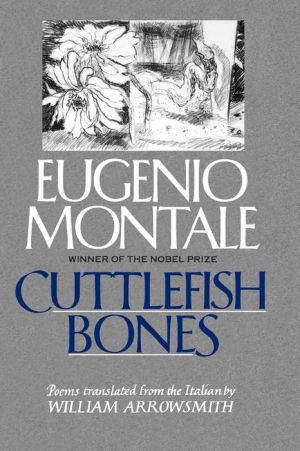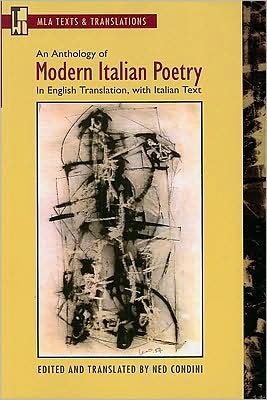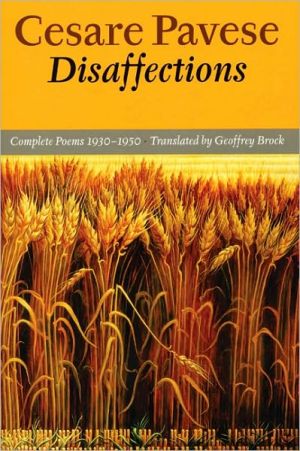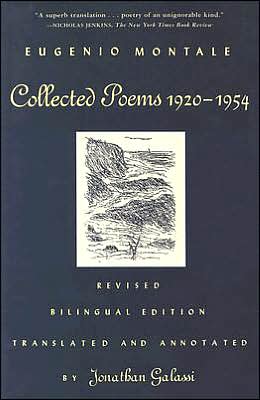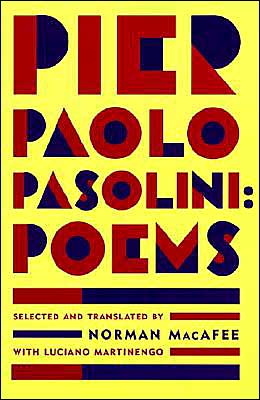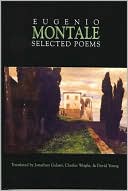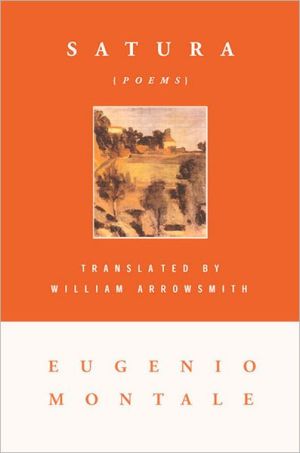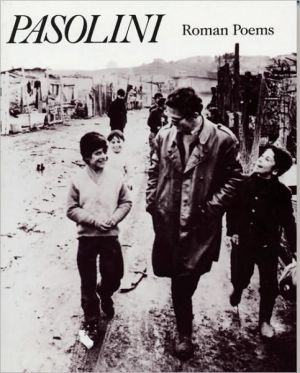Cuttlefish Bones: 1920-1927
A collection of works that won the Nobel Prize and established Montale as the greatest Italian poet since Leopardi. The renowned classicist, translator, and critic William Arrowsmith translates all three volumes.
Search in google:
"Virtually incomparable. . . . [Arrowsmith] has quite literally distilled this poetry's essence in order to recompose it with all of its colors, scents, and exquisitely understated potency intact." —Rebecca WestPublishers Weekly``All my poetry,'' Montale ( The Storm and Other Things ) once said, ``is a waiting for the miracle.'' That miracle began with the extraordinary voice that speaks in this first book, Ossi di seppia , published in 1925 when Montale was 29: an authentic, anti-heroic voice that would compel recognition of Montale as the great modern Italian poet and lead to the Nobel Prize for Literature in 1975. This volume disarms readers with simplicity of scene and language: the poem-scapes originate in the rocky, sun-struck seacoast of idyllic Liguria where Montale spent his youth; Montale's precise images are classically spare, and his syntax is linear and lean. But his concerns are neither simple nor spare. Given a modern universe in which existence is uncertain and ``more cruel than futile,'' the poet can no longer dictate or merely feel, cannot retreat to medieval ideology or Romantic posturing. Montale invites the reader, the ``passerby,'' into an intimate relationship in which the poet speaks as a sympathetic but ironic friend; the poet invites his reader to ``find a break in the meshes of the net / that tightens around us, leap out, flee!''but warns of his poetic limitations: ``Don't ask me for formulas to open worlds / for you: all I have are gnarled syllables, / branch-dry. All I can tell you now is this: / what we are not , what we do not want.'' New readers of Montale will appreciate the critical introduction to his oeuvre, with detailed notes including exegeses of the seminal poems, and Arrowsmith's masterful and subtle translation. But critical apparatus is only a pleasing adjunct: these poems stand powerfully on their own and reach straight to the reader: ``Bring me the flower that leads us out / where blond transparencies rise / and life evaporates as essence. / Bring me the sunflower crazed with light.'' (Aug.)
Translator's PrefaceRejoice when the breeze . . .3The Lemon Trees7English Horn11Falsetto13Minstrels17Cafe at Rapallo19Epigram23Almost a Fantasia25Where girls with wavy hair pass by . . .27Walk more warily now . . .29The fire crackling . . .31But where is the lover's tomb . . .33Wind and Banners35Shoot stretching from the wall . . .37Don't ask me for words . . .41To laze at noon . . .43Don't take shelter in the shade . . .45I think again of your smile . . .47What I ask, my life . . .49Bring me the sunflower . . .51I have often met . . .53What you knew of me . . .55There Triton surges . . .57I know that moment . . .59Splendor of noon outspread . . .61Happiness won . . .63Again the canebrake . . .65Maybe one morning . . .67Valmorbia . . .69Your hand was trying . . .71The children's farandole . . .73Faint wind-borne sistrum . . .75The windlass creaks . . .77Haul your paper boats . . .79Hoopoe, merry bird . . .81Above the graffiti-covered wall . . .83A squall . . .87O Ancient, I am drunk . . .89At times, climbing down . . .91I have lingered . . .93Suddenly, at times . . .95What tomorrow will bring . . .97I would have liked to feel rough . . .99If only I could force . . .101Squander, if you want . . .103End of Childhood107O scirocco, rabid gale . . .115And now they're gone . . .117Now the calm returns . . .119Pool121Eclogue123Flux127Slope131Arsenio135Chrysalis139Moire145House by the Sea151The Dead155Delta159Encounter161Seacoasts . . .167Notes and Commentary171
\ Publishers Weekly - Publisher's Weekly\ ``All my poetry,'' Montale ( The Storm and Other Things ) once said, ``is a waiting for the miracle.'' That miracle began with the extraordinary voice that speaks in this first book, Ossi di seppia , published in 1925 when Montale was 29: an authentic, anti-heroic voice that would compel recognition of Montale as the great modern Italian poet and lead to the Nobel Prize for Literature in 1975. This volume disarms readers with simplicity of scene and language: the poem-scapes originate in the rocky, sun-struck seacoast of idyllic Liguria where Montale spent his youth; Montale's precise images are classically spare, and his syntax is linear and lean. But his concerns are neither simple nor spare. Given a modern universe in which existence is uncertain and ``more cruel than futile,'' the poet can no longer dictate or merely feel, cannot retreat to medieval ideology or Romantic posturing. Montale invites the reader, the ``passerby,'' into an intimate relationship in which the poet speaks as a sympathetic but ironic friend; the poet invites his reader to ``find a break in the meshes of the net / that tightens around us, leap out, flee!''but warns of his poetic limitations: ``Don't ask me for formulas to open worlds / for you: all I have are gnarled syllables, / branch-dry. All I can tell you now is this: / what we are not , what we do not want.'' New readers of Montale will appreciate the critical introduction to his oeuvre, with detailed notes including exegeses of the seminal poems, and Arrowsmith's masterful and subtle translation. But critical apparatus is only a pleasing adjunct: these poems stand powerfully on their own and reach straight to the reader: ``Bring me the flower that leads us out / where blond transparencies rise / and life evaporates as essence. / Bring me the sunflower crazed with light.'' (Aug.)\ \ \ \ \ Library JournalAlthough the work of the great Italian poet Montale, who died in 1981, has been frequently rendered into English (by Antonino Mazza, Jeremy Reed, Irma Brandels, and others), only the late Arrowsmith has given us translations of every volume. His final effort was Montale's first book, Ossi di Seppie, a very visual collection of verses contrasting sea and land, city and country, self and others. Montale's absorption with the musicality of language infused his poetry with a richness difficult to capture in English. Arrowsmith has chosen to make a fairly literal translation lacking much of the original's sonority. While leaving readers relatively far from Montale's melody, it does bring them close to his intellectual and inspirational intent. This collection, along with Occasions and The Storm and Other Things , completes the trio of books that won Montale the 1975 Nobel Prize for Literature. They belong in all library collections of literature in translation.-- Judy Clarence, California State Univ. Lib., Hayward\ \
